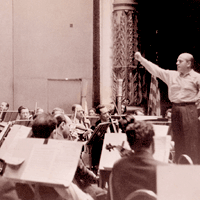Kile Smith, Curator of the Free Library’s Edwin A. Fleisher Collection of Orchestral Music and host of WRTI’s Discoveries from the Fleisher Collection monthly program, takes a moment to speak to the Free Library Blog about his lifetime love of music.
- How long have you worked at the Fleisher Collection?
“I started in, gulp, 1981, as a part-time copyist while I was getting my Master’s, and became full-time in 1983.”
- Do you have a degree in music?
“Yes, a B.Mus. and an M.Mus., both in music composition.”
- Do you play any instruments?
“I’m a fairly good choral singer, but make no pretensions that I’m an actual singer. I play various percussion instruments in an early-music group, Quidditas. In my mis-spent youth I played bass guitar, rising to the level of solid mediocrity.”
- Do you compose music?
“Composing has become my lifelong excuse for not being a better bass player.”
- What are some pieces you have composed?
“I’ve written lots of things orchestras have played, lots of choral music, mostly for church, and a good number of songs for solo voice with piano. Right now I’m composing a concerto for french horn and string orchestra to be played by the Philadelphia Classical Symphony in March 2007 by the new principal hornist of the Philadelphia Orchestra, Jennifer Montone.”
- Do you use the Fleisher?
“I deposit my orchestral music here, something we offer to contemporary composers.”
- Why do you think it’s an interesting collection?
“It’s really unbelievable. We have works here that don’t exist anywhere else, including 19th- and 20th-century works (American and international), and brand-new pieces. I can’t tell you how many times I’ve heard a conductor say, “I can’t believe you have this!” Mr. Fleisher was a true visionary when he started his library in 1909, as was the Free Library when they accepted the Collection in 1929. We’ve been building it ever since.”
- What is the most interesting request for material you have ever had?
“One morning the phone rang and it was a record company in London. They were looking for a particular piano concerto, the 4th, by the German composer Franz Xaver Scharwenka. He’s not a big name, even among cognoscenti, so as I didn’t know off the top of my head I told them I’d look in the card catalog. When I came back to the phone I told them we had all his concertos, 1 through 4, and I heard a gasp over the phone all the way from London, followed by a breathless recounting of how they had searched everywhere-Europe, the BBC, anywhere they could think of-to come up with this, that the pianist was already booked, the recording studio was already booked, we didn’t know what we were going to do, and thank you thank you thank you thank you for having this, and would it be a problem to ship it to us? And I said How’d you like to get it Thursday, and another gasp over the phone and Yes! Wonderful! We will call you first thing from now on! (We also had the Emil Sauer first concerto, which they were also looking for.) The CD went on to win the Gramophone Magazine Record of the Year Award for Stephen Hough, pianist, and Hyperion Records.”
- Have you discovered any composers you didn’t previously know about working there?
“Tons; it’s scary. One who’s really interesting is William Henry Fry, the first American-born composer to write large symphonic music, and the first American to write a grand opera. His half-hour Santa Claus Symphony from 1853 is a hoot. First orchestral piece-anywhere-to use saxophone, for one thing. That and three others of his works are now recorded on Naxos, when they asked me for suggestions of American composers to record. He’s a Philadelphia guy, too.”
- If you could play the whole world a piece of music that is in the Fleisher, what would it be and why?
“The Mass in B minor of J.S. Bach. It’s an ironic choice, I suppose, since that wouldn’t originally have been in Fleisher. He didn’t collect choral music, and we didn’t start adding chorus and orchestra works until the late1970’s. The B minor Mass is simply Mount Everest. It sums up everything there is in music. It can make a composer want to give up composing!-but not really; it draws you in, and sends you forth to something higher, something better, something that’s in all of us.”
Have a question for Free Library staff? Please submit it to our Ask a Librarian page and receive a response within two business days.

